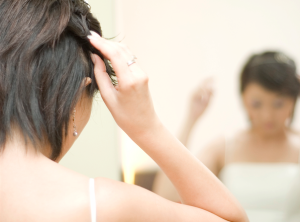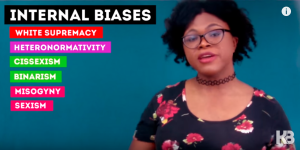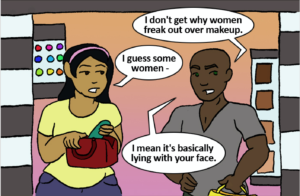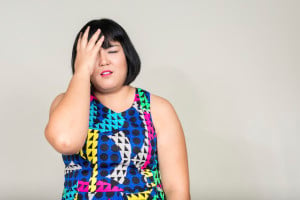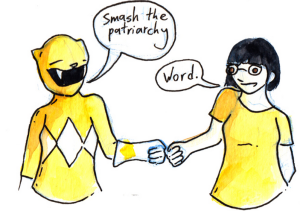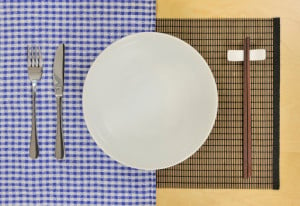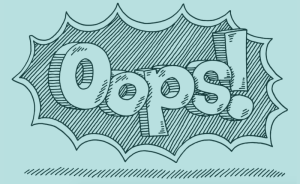“We all eat. We all have families who tell us what to eat, when to eat…They tell us we’ve eaten too much, too little, and too much again. One day we’re too skinny. And within a matter of days, we’re too fat. We see other Asians…and teeny tiny appears to be our norm. These thoughts turn into actions, and we awaken one day to find that we need to justify everything that we put in our mouths.” —Lynn Chen and Lisa Lee (Thick Dumpling Skin)
Whenever I see or talk to my mom, she asks me if I’ve been exercising.
I’m her only child, and she focuses all of her love and attention on me. She loves me so much that she wishes I took care of myself better by working out more or eating “healthier.” She loves me so much that she notices when I gain weight, and she won’t hesitate to tell me when I have. “Did you know you are getting ‘pàng’ (fat)?” she asks and pats my stomach.
As if I didn’t already know. As if I didn’t pinch at my body or grab the folds of fat around my waist or under my arms.
After college, when I had gained weight at the end of senior year, she took me to the doctor to see if my thyroids were off because my neck looked thicker than usual.
No, nothing was wrong. I was just getting “fat.”
I started writing everything I ate on pieces of paper and looking up the calories. I went to the gym two or three times a day, obsessed with extending my workouts so that I could burn more. Counting, always counting, my calories and the pounds I weighed.
I started doing things – like working out before visiting home – because I wanted to look thinner for my parents. Even still, I constantly ask my partner whether or not he thinks I’m “smaller” than him, and I ask him what he’s eaten during the day so I can make sure I’m eating less.
All of these comparisons are meaningless, yet so significant. The relationships I have with food, my body, and my family are complicated.
I feel alone.
Navigating body size and image as an Asian American woman, especially as a daughter of immigrant parents, can be difficult.
I love my mom and think she is an amazing woman that I deeply respect. But this doesn’t mean that her obsession with my weight and my body isn’t incredibly unhealthy emotionally, physically, and mentally.
And it wasn’t until I started talking to other Asian American women who have immigrant parents that I realized that this is a thing – that I am not alone, and neither are you.
So, in solidarity, I want to offer these four things that I navigate and think about when it comes to body image and culture.
1. The Cultural Pressure to Be Small, Delicate, and Thin
“As Asian American girls, we are supposed to be short, lightweight, petite, soft-spoken, and light skinned, with long, straight jet-black hair… [T]he stereotype that Asians were supposed to be thin made me feel like I was a freak of nature.” —Julie Wong*
There is cultural pressure from both within and outside the Asian American community for Asian women to be small, delicate, and thin.
Historically and presently, Western media portrayals of Asian women sexualize us into exotic objects of desire. Consequently, the utility of an Asian woman’s body becomes about being a passive commodity of sex.
We are stereotyped as demure – and therefore, submissive. Thus, our bodies must also be seen as easy to control, easy to dominate: delicate and small.
Depictions of Asian women in television shows, movies, and magazines show us as tiny and skinny – depersonalized, cookie cutter images of beauty.
And within our communities, being beautiful is also equated with being “American.”
We are measured under both “white standards of beauty”, which also values thinness, as well as standards set by our own communities. Both of which push this message onto us: Asian women must be beautiful, and beautiful women are thin. We get the message that thinness is a priority from multiple angles.
And while the pressure to be thin is experienced by many across races and I don’t experience oppression because of my body size alone (that’s thin privilege), I do experience oppression based on a specific racialized expectation that normalizes all Asian women’s bodies as thin.
Racialized people cannot escape the “for/because” clause of their bodies. We are either seen as skinny because we are Asian women or as “too fat” for an Asian woman.
This expectation creates an internal struggle over what our bodies could be and should be.
On one side, there are fat-shaming comments at home. On the other side, mainstream white American culture presumes and expects me to be thin. I simultaneously hold thin privilege in the broader society. yet also hold a specific cultural pressure constantly to be thinner.
Yet, while I worry about whether or not I meet beauty standards – and while my internal struggle with body size is impacted by culture, race, and family – these negative feelings don’t mean that I deal with society’s fatphobia. But many Asian women do.
Writer and comedian Margaret Cho is described as “non-dainty” and having “thunder thighs” by media, and as a result, suffered through unhealthy weigh loss methods after pressure from both the media and her Asian American community.
She says, “I have never been a heavy person, but for some reason, [Korean people] feel that I am too large for them to be comfortable, too large to be one of them.”
The “perfect” body for Asian women is an illusion. And yet, it creates a constant pressure to be seen as skinny, to try to be skinnier – and in turn, to be more Asian: “Why can’t I just be thin like the ‘other Asian girls?’”
This pressure also creates tension with our cultural traditions around food as our relationships with food and our bodies are constantly pushing up against each other.
2. The Cultural Pressure to Share and Eat Food
“In Chinese culture, eating is seen as a form of affection and commitment to the family, so I always ate every meal, every single kernel of rice in my bowl. But I also felt fat and unfit to be the ‘perfect’ Asian girl.” —Noel Duan
I love food – I’ve been taught to love it by my family.
We express love through food – gathering for family dinners, cooking special dishes whenever we have a guest, the passing of plates around the table, and serving each other to make sure nobody’s plate ever goes empty.
Sharing and eating food together is integral to Asian and Asian American culture, and choosing to eat or not eat can be a complicated process.
Like other Asian women, I feel like I must be thin in order to be attractive, but I must also participate in food sharing and eating in order to belong in my family and culture.
Whenever my family returns to Taiwan, our relatives celebrate each other through feasts. We even greet each other by asking “Have you eaten yet today?” And no matter the answer, they always encourage we try snacks or leftovers.
When I was little, my aunts and uncles would wrap their hands around my wrist and say, “Too skinny. Not eating enough.” They’d fill up my plate with more food and push another bowl of rice at me. As I got older, though, they would watch me fill my second plate of food and say, “She must love to eat.”
My family and our cultural traditions focus both on eating food and losing weight. I am connected to my Taiwanese roots through food because it is a tangible part of my culture and history – but together, this creates mixed messages between food-shaming and honoring food traditions.
And these aren’t the only mixed messages we’re dealing with.
3. Fighting Internalized Sexism and Fatphobia
“The feminist in me wants to be stronger than these standards, get over these doubts, and be happy with my body. The teenager in me just wants to fit into skinny jeans.” —Jennifer Chen
As I became more critically aware I became about body image and feminism, I recognized my own internalized fatphobia.
As a feminist, I feel like I’m supposed to love my body the way that it is, but due in large part to these messages, I constantly compare myself to other Asian American women, silently fat-shaming myself and others around me on an almost daily basis. I also start to confuse and conflate thinness with healthiness.
I try to remind myself that there’s no such thing as feeling fat – that these feelings are intertwined with cultural pressures and emotional stresses.
These feelings of internalized fatphobia are also culturally intertwined with internalized sexism.
From within the community, internalized sexism plays a key role in perpetuating the ideology that all Asian women are thin. We have to be thin to be attractive, and we have to be attractive to find a partner.
In our parents’ generation and older, a cultural imperative for women was to seek a husband, preferably handsome and wealthy. Women dealt with social and parental pressure to get married in order to achieve social and economic mobility and to secure a promising future.
When my parents moved to the United States to seek other opportunities for themselves and for me, they tried to shake some of these traditional ideas. However, they internalized some messages. Their desires for me to find a partner and raise a family continued to linger. Part of my marriage potential became linked with how I look.
When I was young, my parents told me that if I didn’t eat all the grains of rice off my plate, I would end up with a husband whose face had as many pockmarks as my leftovers. Now that I’m older, the message that I get is about eating less at dinner so my partner doesn’t think I’m a pig.
I’ve been told multiple times by my mom I need to work out, eat healthier, and maintain a certain level of fitness in order to keep my partner’s interest. A part of me believes in these messages and perceives my own worth in relation to body size and my potential to be someone’s wife.
Caring about my future means caring about my body, which also means being thin.
These internalized oppressions are difficult to hold all at once – and made more difficult if you don’t have anyone to turn to.
4. The Complication of Not Having Anyone to Talk To
“Tomorrow, I will pretend that nothing is wrong and that everything is fine and no one will suspect. No one. No, because I am not a walking skeleton, and I’m not white, and because I am the president of our Asian American Club, and I’m an Asian American feminist, and because I am so strong.” —Alice Chung*
The first time I decided I would try seeing a therapist, I went to someone who wasn’t Asian American. We talked about body image and one of the questions she asked me was, “Do you think your parents are demanding and oppressive?”
Immediately, I jumped to their defense: I love my parents. They are encouraging. They are supportive. They love me so much.
White, mainstream society has bought into the ”Tiger Mom” trope, which enables the model minority myth by attributing Asian American “success” and “achievement” to controlling parenting. Asian immigrant parents are seen as overbearing, demanding, and strict.
However, because racism toward Asians is treated differently than racism toward other groups, this parenting stereotype is not understood widely as racist.
Sure, my relationship with my parents has its ups and downs, but our miscommunications and disagreements shouldn’t be simplified down to a generalized and racialized quality.
The love, respect, trust, awe, and support I feel from and for my parents become lost when speaking to folks who aren’t Asian American.
I don’t know how to talk to anyone outside of the Asian American community about my struggle with body image and my strained relationships around food and family without feeling like I’m criticizing my parents or throwing them under the bus.
People outside of the community don’t have the same cultural context or understanding.
I often feel very alone in these thoughts and struggles – and it isn’t just white, mainstream culture alienating me. It also feels impossible to have these conversations within my family system.
Having conversations with my family is difficult.
We don’t talk as much about our feelings; plus, there’s a language barrier. Even though my parents are fluent in English and I can speak a fair amount of Chinese, nuances get lost in translation.
Despite bluntness in talking critically about body size and weight, talking openly about emotions is taboo, so any struggles around body image and mental health are often incorrectly seen as a personal weakness or failure.
My frustration is retranslated as an inability to discipline my body and its impulses – too lazy to work out, too gluttonous to diet.
When I had no one to turn to for support, I was isolated. I am trapped between protecting and loving my family, but craving affirmation and validation about my emotional conflicts with body, food, and family.
It helps to read other women’s experiences and to talk about my own experience with other Asian American women. It makes me feel less alone in my struggle and more understood by others.
I’m hoping to add to that body of literature so that you, too, can feel less alone.
***
When my mom visited me recently, the last thing she said to me was this: “Goodbye! Don’t forget to exercise! I love you.”
I’m still learning how to love and appreciate my body, and I’m still figuring out how to resist messages of what an “ideal” Asian American woman’s body should look like.
I still have tons of questions about how to maintain loving relationships with my parents while also holding them accountable when it comes to the ways they talk about my body and the way that makes me feel, all the while trying to develop a more balanced relationship with food and exercise.
These things can’t be done overnight – and they’re really hard to do without a supportive community that can bring together a critical feminist perspective and cultural understanding.
But the realization that there are other Asian American women like me struggling to love food, family, and our bodies is an important beginning to moving forward.
* Excerpts from For YELL-Oh Girls! (Edited by Vickie Nam)
[do_widget id=”text-101″]
Rachel Kuo is a Contributing Writer for Everyday Feminism and a scholar and educator based in New York City. Her professional background is in designing curriculum and also communications strategy for social justice education initiatives. You can follow her on Twitter @rachelkuo.
Search our 3000+ articles!
Read our articles about:
Our online racial justice training
Used by hundreds of universities, non-profits, and businesses.
Click to learn more


